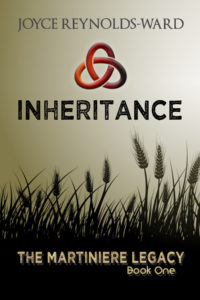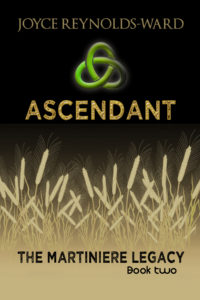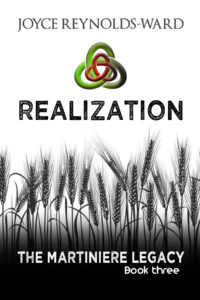One thing I decided to do with The Martiniere Legacy was to make my main protagonists, Ruby Barkley and Gabriel Martiniere Ramirez, specifically in their 50s/60s. In part this was due to the nature of the story. Ruby and Gabe needed to have an extensive past history that impacts their choices throughout the trilogy. Both Gabe and Ruby have reasons to win the Superhero that are tied to years of debt and struggle, and the hope that finally they can not only pay off their bills but also use that cash to launch projects that have been years in development. We don’t see much of Gabe’s Moondance Microbial projects because he eventually gets wrapped up in Martiniere family issues, but we do see a lot of Ruby’s RubyBot, a biobot that not only monitors field conditions down to nearly the plant level and reports back regularly, but can perform limited pest/weed control and water stress management in different forms (some of this is also due to author limitations because I can wrap my head around biobot development much more easily than the rapidly changing field of microbials–thanks in part to research for The Netwalk Sequence).
On a different level, another reason to write older protagonists was to hearken back to what was becoming an ongoing theme through the books–how people grow, change, and reunite. I doubt that I’ll write much in the way of side stories about Ruby and Gabe’s early years together, especially since that would require a deeper consideration of how Covid-19 eventually plays out in society. There’s just too much in flux (and I’ll write about my choices with regard to Covid-19 in another post). Another reason is that we see enough of that era through Ruby’s memories and the times that she and Gabe talk about the past while trying to figure out their future, and how they’ve been unknowingly manipulated by their enemies. Gabe and Ruby have to make conscious choices about how their past ways of handling relationship issues created problems, and how to fix them. We end up seeing a lot of this self-examination in Ascendant, where they actively start building a future together. To succeed they both have to reinvent not only themselves but a relationship that was abruptly terminated twenty-one years earlier.
I’ll admit representation plays a small piece in my choice. Ruby as the POV is the voice of a 50-something woman who has successes and failures in her life but who has not been defined by her relationship with a man for many years. We don’t see enough of that sort of thing except in (sorry for fans of these sort of stories) mundane literary works where an older woman, usually a recently divorced housewife, is struggling with issues in everyday life and her conflicts never rise above “how do I pay my bills?” “How can I fall in love after being dumped for a younger woman?” Why can’t an older woman be working with tech stakes, threats, AND personal issues? Why not an older woman with agency, determination, and a history of doing what is needed? After all, the personal issues do add an additional layer of conflict to the external stakes for Ruby and Gabe. And I do admit a certain degree of annoyance at stories that sideline older women to cottages and gardens and playing grandma, nothing more.
But another piece is that age also brings with it some tangible personal limitations. Gabe starts out the story crippled by a post-G9 virus syndrome. He wrestles with medication issues (and I probably understated those). Ruby is in better condition, but she has fatigue, aches, and pains. Neither have the strength to do what they could have done twenty-one years earlier. And that adds an additional layer of complication, especially in a profession that is as physically demanding as ranching and farming. The clock is ticking on both of them, even more than it would be for younger protagonists.
I’m hoping that readers like this perspective. But we shall see.
The Martiniere Legacy: Book One, Inheritance; Book Two, Ascendant; and Book Three, Realization will be released in Fall 2020, along with side stories and sketches. More specific information can be found in my newsletter which comes out toward the end of each month. Sign up for my newsletter at https://tinyletter.com/JoyceReynolds-Ward for release dates.



